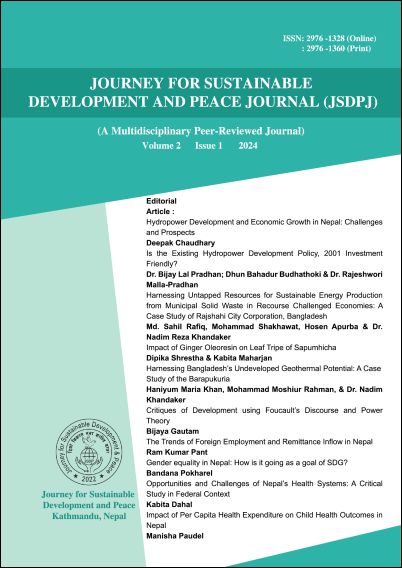Harnessing Untapped Resources for Sustainable Energy Production from Municipal Solid Waste in Recourse Challenged Economies: A Case Study of Rajshahi City Corporation, Bangladesh
DOI:
https://doi.org/10.3126/jsdpj.v2i1.63240Keywords:
Anaerobic, Rajshahi City Corporation, Municipal Solid Waste, LandfillAbstract
The sustainable management of municipal solid waste is of utmost importance for cities in Bangladesh, including Rajshahi City, which faces unique challenges due to rapid urbanization, industrial growth, and population expansion. This study aimed to gain insights into waste generation patterns and characteristics in Rajshahi by analyzing factors like moisture content, bulk density, dry density, and calorific value of municipal solid waste at the Rajshahi landfill site. The objective was to identify the most feasible method for waste characterization and segregation. The research methodology utilized a comprehensive approach, incorporating field surveys, laboratory analyses, and statistical modeling to create an energy matrix and assess the potential for waste-to-energy production in Rajshahi City. This study aligns with several Sustainable Development Goals (SDGs) related to waste and energy management, including SDG 7: Affordable and Clean Energy - by exploring waste-to-energy options. SDG 11: Sustainable Cities and Communities - by addressing waste management challenges in a rapidly urbanizing area. SDG 12: Responsible Consumption and Production - by promoting sustainable waste management practices. SDG 13: Climate Action - by potentially reducing greenhouse gas emissions through efficient waste-to-energy conversion. Overall, this research contributes to Rajshahi City's efforts to achieve sustainable development while addressing its waste and energy needs by converting its 75.8% organic waste to electricity using an anaerobic digester.
Downloads
Downloads
Published
How to Cite
Issue
Section
License
This license enables reusers to distribute, remix, adapt, and build upon the material in any medium or format for noncommercial purposes only, and only so long as attribution is given to the creator.




